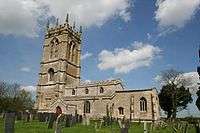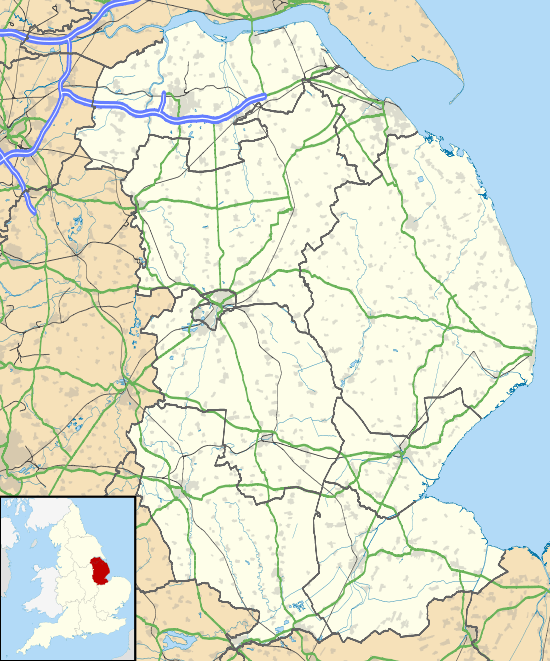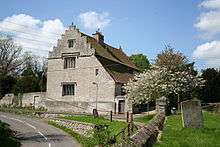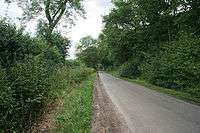Great Ponton
Great Ponton is an English village and civil parish in the South Kesteven district of Lincolnshire, situated 3 miles (5 km) south of Grantham, on the A1 trunk road, which bisects the village. The tower of the parish church is a landmark beside the road. In the 2001 Census, the population was recorded as 333, of whom all were of white ethnic origin and 87 per cent described themselves as Christian. The average age was 40.[1] The population of the civil parish had risen to 379 at the 2011 Census.[2]
| Great Ponton | |
|---|---|
 Church of The Holy Cross, Great Ponton | |
 Great Ponton Location within Lincolnshire | |
| Population | 333 2001 Census[1] |
| OS grid reference | SK924302 |
| • London | 95 mi (153 km) S |
| Civil parish |
|
| District | |
| Shire county | |
| Region | |
| Country | England |
| Sovereign state | United Kingdom |
| Post town | GRANTHAM |
| Postcode district | NG33 |
| Dialling code | 01476 |
| Police | Lincolnshire |
| Fire | Lincolnshire |
| Ambulance | East Midlands |
| UK Parliament | |
History

The village is named in the Domesday Book of 1086 as Magna Pamptune, probably meaning "farmstead by a hill". Some material remains have been found dating back to the Neolithic age. Remains of a mid-Bronze Age round barrow cemetery were discovered between Great Ponton and Sproxton in 1959.[3] The village belonged to the historical wapentake of Winnibriggs and Threo.[4]
The village church dedicated to the Holy Cross dates from the 13th century. Its pinnacled tower was added in 1519 at the expense of Anthony Ellys, a wool merchant of Ellys Manor House, which is open to the public.[5][6] The church weather vane depicts a gilded fiddle. The educationalist and school textbook writer Charles Hoole was briefly rector from 1642.[7] Joshua William Brooks, who had been responsible while vicar of St Mary's Church, Nottingham for founding six new churches there, was rector in Great Ponton in 1864–1882.[8]
The Grade I church is among nine listed buildings in the village, six of them residential.[9]
Great Ponton railway station opened in 1853 and closed for passengers on 15 September 1958.[10]
Great Ponton has a limestone quarry.
Geography
Great Ponton is on the A1 approximately 3 miles (5 km) south of Grantham. A footbridge provides pedestrian access from the west of the village to the east over the A1.[11] To the east is the River Witham[12] and the East Coast Main Line.

Nearby villages include Stoke Rochford, Stroxton and Little Ponton. To the north is the parish of Little Ponton and Stroxton, and the parish boundary crosses the A1 at 200 metres (219 yards) south of the electricity pylons, opposite Gibbet Hill, to the west. Due east, it crosses Ermine Street (B6403) south of Ponton Park Wood. It meets Boothby Pagnell west of Boothby Great Wood, and the boundary skirts the wood's western edge. East of Ponton Great Wood, on the road to Boothby Pagnell, it meets Bitchfield and Bassingthorpe, with the boundary following the road westwards, to the north of Bassingthorpe New Plantation.
The boundary follows the western side of the plantation southwards to the Bassingthorpe road, west of Stoke Tunnel Farm, where it meets Stoke Rochford. It follows the road, south of Pasture Farm,[13] to the west of the East Coast Main Line road bridge,[14] and from the bridge runs due west to the A1 at North Lodge Plantation, and meets Cringle Brook, which meanders alongside the A1 northwards to the village. The boundary passes to the south of Cindertrack Plantation, and to the north of Halfmoon Plantation, where it meets Wyville cum Hungerton. A half mile north it meets Little Ponton and Stroxton.
The hamlet of High Dyke lies 1 mile (1.6 km) south-east of Great Ponton, where the East Coast Main Line bridges High Dyke, a stretch of Roman road forming part of Ermine Street.
Community
.jpg)
Great Ponton Parish Council meets every two months.[15]
Holy Cross Anglican Church, with St Guthlac's Church at Little Ponton, is in the Colsterworth Group of parishes in the Diocese of Lincoln. The Methodist Dallygate Chapel, built in 1805, closed for worship in 1975.
Great Ponton Church of England Primary School, with a roll of about 70, occupies modern premises in Mill Lane.[16][17] A February 2015 Ofsted inspection rated the school Grade 2, 'Good' for "overall effectiveness".[18] The rating was confirmed in 2018.[19]
Great Ponton Village Centre, on Archers Way, is a community centre for social events and functions. The village playing fields are used by local cricket and football clubs.[20][21] The Ponton Plod is an annual long-distance walk and run that raises money for charity. It starts and finishes at the Village Centre.[22]
There is a garage-cum-shop at Ponton Main Service Station on the north-bound carriageway of the A1. The former Blue Horse public house facing the south-bound carriageway has been converted into flats.[23]
The village has a daytime, weekday bus service to Grantham.[24]
References
- "Resident Population and Age", Lincolnshire Research Observatory.
- "Civil Parish population 2011". Neighbourhood Statistics. Office for National Statistics. Retrieved 18 May 2016..
- "Great Ponton Quarry", Archaeology Data Service. Retrieved 18 March 2016.
- "Winnibriggs and Threo Wap", A Vision of Britain Through Time. Retrieved 16 March 2012.
- "Holy Cross, Great Ponton", Colsterworth Group of Parishes. Retrieved 18 March 2016.
- "Ellys Manor House" Archived 23 October 2014 at the Wayback Machine, Ellysmanorhouse.com. Retrieved 25 October 2014.
- Watt, Francis; "Hoole, Charles" Dictionary of National Biography, 1885–1900, Volume 27. Retrieved 18 March 2016.
- M. W. Bowen (1997) The Anglican Church in the Industrialised Town, St. Mary's Parish, Nottingham 1770–1884, October 1997.
- "Listed Buildings in Great Ponton, South Kesteven, Lincolnshire", British Listed Buildings. Retrieved 18 March 2016.
- Gerald David Daniels and Leslie Alan Dench, Passengers No More, 2nd ed, London: Ian Allan, 1973, p. 56.
- Fareham, Steve; "Footbridge over the A1 at Great Ponton" Geograph, 7 May 2009. Retrieved February 2019.
- Green Brian; "River Witham valley", Geograph, 17 February 2008. Retrieved February 2019.
- Tatlow, Andrew; "Track to Pasture Farm", Geograph, 19 April 2006. Retrieved February 2019.
- Pepper, Duncan; "Railway Bridge over Ermine Street", Geograph, 24 May 2009. Retrieved February 2019.
- "Great Ponton Parish Council" Lincolnshire Parish Councils - South Kesteven, Lincolnshire County Council. Retrieved 18 March 2016.
- Great Ponton Primary School, web site. Retrieved 18 March 2016.
- "C of E Primary School", Geograph, photograph. Retrieved 18 March 2016.
- "Great Ponton Church of England School", Ofsted report, 2016. Retrieved 10 February 2019.
- "Great Ponton Church of England School", Ofsted short inspection report, 2018. Retrieved 10 February 2019.
- "Great Ponton Parish Council", Lincolnshire County Council. Retrieved 18 March 2016.
- Great Ponton Village Centre web site. Retrieved 18 March 2016.
- The Ponton Plod web site. Retrieved 18 March 2016.
- "Blaze in cellar of former pub off the A1 at Great Ponton", The Grantham Journal, 2 July 2015. Retrieved 18 March 2016.
External links

- "Picture Gallery", Great Ponton Parish Council